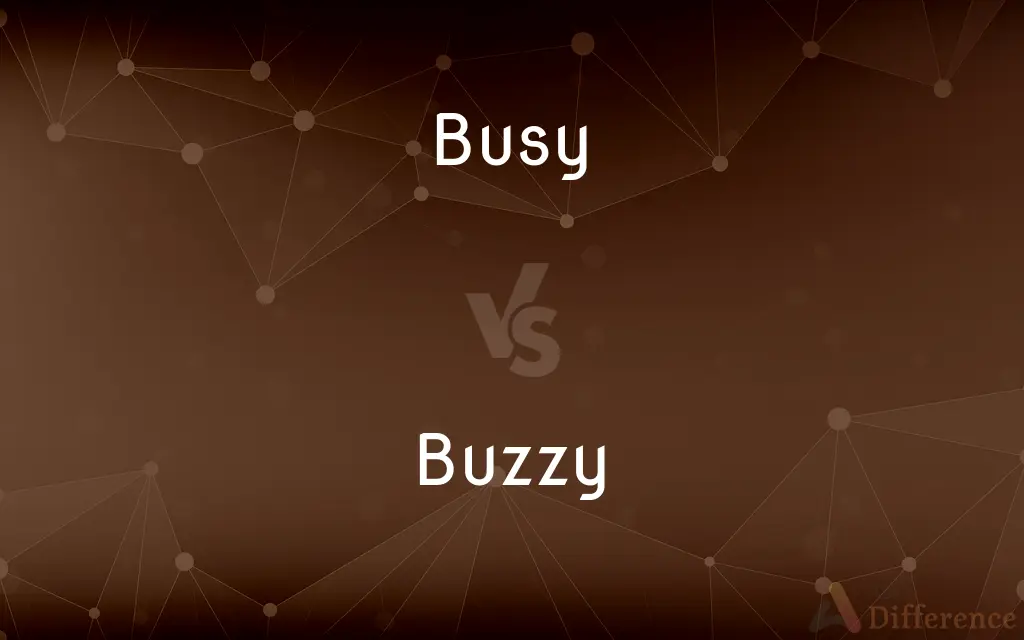Busy vs. Buzzy — What's the Difference?
By Maham Liaqat & Fiza Rafique — Updated on February 27, 2024
Busy refers to having a lot to do or being actively engaged in tasks, while buzzy describes a situation or place characterized by excitement, activity, or noise, often akin to the sound or feeling of buzzing.

Difference Between Busy and Buzzy
Table of Contents
ADVERTISEMENT
Key Differences
Busy and buzzy share a superficial similarity in spelling and sound, yet they convey distinct concepts. The term busy is primarily used to describe a state of being occupied with tasks or activities. It applies to individuals who have little free time due to work, chores, or other commitments. A busy person might be juggling multiple responsibilities or working through a lengthy to-do list. This term emphasizes the volume of tasks or the intensity of engagement rather than the nature of the activity itself.
Buzzy captures an atmosphere or vibe that is lively and filled with energy. It’s often used to describe places like restaurants, neighborhoods, or social events where there is a palpable sense of excitement or activity. The "buzz" can refer to literal noise, such as conversation, music, or ambient sounds, or metaphorically to the energetic feel of a place. A buzzy environment might be one that attracts a lot of people due to its popularity or because it's the site of interesting or trendy activities.
The difference between being busy and being in a buzzy environment can also reflect on one's personal experience versus the collective experience of a place or event. Being busy is a subjective state, while being buzzy is an attribute of an environment that affects those who are present.
"Busy" has a more individual and task-oriented connotation, "buzzy" is communal and atmosphere-oriented, often suggesting a shared experience of excitement and activity.
Comparison Chart
Definition
Engaged in activities or having a lot to do.
Characterized by excitement, noise, or activity.
ADVERTISEMENT
Context
Personal workload or schedule.
Atmosphere or vibe of a place or event.
Connotation
Often implies a lack of free time.
Implies a lively, vibrant environment.
Usage
Describes individuals or their schedules.
Describes places, events, or environments.
Example
A busy day filled with meetings and deadlines.
A buzzy café popular with young artists.
Compare with Definitions
Busy
Engaged in work.
The team has been busy with the new project.
Buzzy
Characterized by a buzz of noise.
The market was buzzy with the sounds of vendors and shoppers.
Busy
Packed with appointments.
Her calendar is busy with back-to-back meetings.
Buzzy
Full of excitement and activity.
The new restaurant is quite buzzy on weekends.
Busy
Having a lot to do; not free.
She's too busy to take a vacation this summer.
Buzzy
Lively and attractive.
That art show created a buzzy atmosphere in the gallery.
Busy
Occupied with tasks.
He was busy preparing his report.
Buzzy
Energetic vibe.
The launch event was buzzy, with guests enjoying the lively setting.
Busy
Having a great deal to do
He had been too busy to enjoy himself
Buzzy
Trendy and popular.
The buzzy neighborhood has attracted a lot of new businesses.
Busy
Keep oneself occupied
She busied herself with her new home
Buzzy
Having a buzzing sound.
Busy
Actively or fully engaged or occupied;
Busy with her work
A busy man
Too busy to eat lunch
The line is busy
Buzzy
(informal) Being the subject of cultural buzz.
Busy
Crowdedwith or characterized by much activity;
A very busy week
A busy life
A busy street
A busy seaport
Busy
Full of activity.
The office is always busy on Mondays.
Common Curiosities
Can a place be busy and buzzy at the same time?
Yes, a location can be both busy (full of people and activities) and buzzy (vibrant and exciting), especially popular spots like markets or events.
Is being busy always a negative state?
Not necessarily; being busy can be fulfilling and productive, though excessive busyness may lead to stress.
How can I make my business feel more buzzy?
Creating a lively, welcoming atmosphere, hosting events, and engaging with trends can contribute to a buzzy vibe.
Does a buzzy place always mean it's noisy?
While "buzzy" often implies a degree of noise from activity, it also encompasses a general sense of energy and excitement that may not be solely noise-related.
Can a busy schedule impact one's social life?
Yes, a consistently busy schedule can limit the time and energy available for social activities and relationships, potentially leading to isolation or strained connections.
Is it possible for an event to become too buzzy?
Yes, if an event becomes overly crowded or loud, it can detract from the enjoyment of attendees, potentially leading to negative experiences or safety concerns.
Can someone feel buzzy?
While "buzzy" typically describes places or environments, it can metaphorically apply to individuals who feel lively or excited.
What makes a work environment too busy?
A work environment becomes too busy when the workload consistently exceeds what can reasonably be managed by the staff, leading to stress, burnout, and decreased productivity.
How do businesses benefit from creating a buzzy atmosphere?
A buzzy atmosphere can attract more customers, enhance the customer experience, and increase the likelihood of customers returning or recommending the business to others.
How can one manage a busy lifestyle without feeling overwhelmed?
Effective time management, setting priorities, incorporating downtime, and seeking support when needed can help manage a busy lifestyle without becoming overwhelmed.
Share Your Discovery

Previous Comparison
Digger vs. Rigger
Next Comparison
Forty vs. FartyAuthor Spotlight
Written by
Maham LiaqatCo-written by
Fiza RafiqueFiza Rafique is a skilled content writer at AskDifference.com, where she meticulously refines and enhances written pieces. Drawing from her vast editorial expertise, Fiza ensures clarity, accuracy, and precision in every article. Passionate about language, she continually seeks to elevate the quality of content for readers worldwide.















































